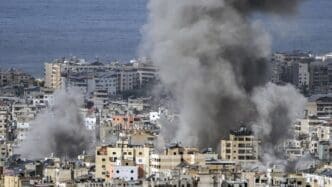In the ongoing conflict between Israel and Hezbollah, attempts to negotiate a ceasefire have hit several roadblocks, despite favorable conditions for an agreement. Diplomatic sources indicate that while many leaders of the militant group have been neutralized by Israeli forces, Hezbollah continues its missile attacks, and Israeli citizens displaced from border areas are eager to return. Meanwhile, the international community is keen to prevent the conflict from escalating further.
Since the beginning of hostilities triggered by the Hamas-led attack on Israel in October 2023, Israel and Hezbollah have engaged in almost daily exchanges of fire. The conflict has resulted in over 3,500 casualties in Lebanon, most of whom are civilians, and more than 70 Israeli deaths, including soldiers. A potential ceasefire deal proposes a two-month cessation of hostilities, with Israeli forces withdrawing from Lebanon and Hezbollah retreating from the area south of the Litani River.
This proposal would involve an increase in Lebanese army presence, with additional troops patrolling the border alongside an existing UN peacekeeping force. An international committee is suggested to oversee the implementation of the ceasefire and UN Security Council Resolution 1701, originally established in 2006 but never fully executed due to ongoing hostilities and territorial disputes.
However, several contentious issues remain unresolved. Israel demands assurances that Hezbollah’s weapons will be removed from border proximities. Israeli officials seek the right to strike in Lebanon should they perceive any violations of the agreement, while Hezbollah has voiced staunch opposition to any deal that compromises Lebanon’s sovereignty or does not guarantee a complete halt to hostilities.
Negotiators are also divided over the composition of the international oversight committee, with Lebanon opposing the inclusion of Britain, while Israel has lifted its objections to France’s involvement. Furthermore, Israel is reluctant to address the 13 border disputes within the ceasefire framework.
A ceasefire would potentially alleviate regional tensions, particularly between Israel and Iran. Although Hezbollah had previously insisted on linking the ceasefire to the outcome of the Israel-Gaza conflict, this condition has since been dropped. Diplomatic concerns linger over the possibility of the war expanding into Syria and Iraq should negotiations fail, as Israel continues to thwart weapon supplies from Iran to Hezbollah.
The path to a ceasefire between Israel and Hezbollah remains fraught with challenges. Despite incremental progress, many obstacles impede a final agreement. As diplomatic efforts persist, the potential for further conflict looms, threatening to draw Syria and Iraq deeper into the ongoing hostilities.
Source: APNews








